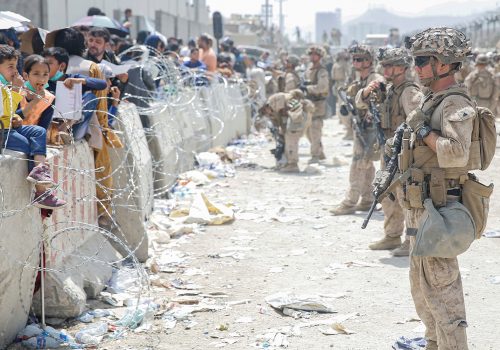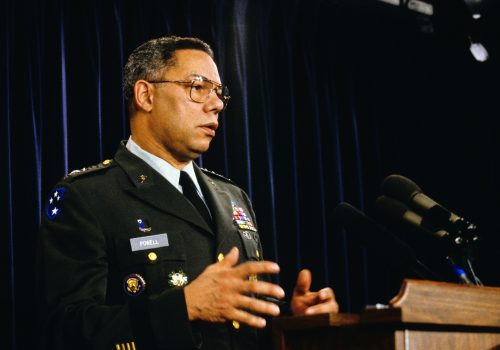Colin Powell’s glorious American journey
General Colin Powell was born on April 5. Why that date is important follows shortly. The story begins in the late summer of 1975, when then Lieutenant Colonel Colin Powell (and wife Alma) joined the National War College (located in Washington, D.C.) as a student in the bicentennial class of 1976, later named the class of “Great Americans.” The National War College is the nation’s most senior and prestigious military educational institution. Even then, it was obvious Powell was destined for four-star rank.
Earlier that year, then Lieutenant Commander Harlan Ullman (with wife Julian) reported for duty on the college faculty as the youngest professor in its history—a mistake not to be repeated. From that point on, the Powells and the Ullmans would become the closest of friends. Julian’s birthday was also April 5, a date we tried to celebrate jointly ever since. The last dinner was in 2019. COVID-19 has since made its tragic mark ending that occasion. But one birthday celebration stood out.
At Colin’s fiftieth birthday party in 1987, he was Lieutenant General Powell and deputy national security advisor, living in housing at Fort McNair where the National War College is also situated. The guest list included Vice President George H.W. Bush and second lady Barbara Bush; Secretary of Defense Caspar Weinberger and his wife, Jane; National Security Advisor Frank Carlucci and his wife, Marcia; and many others, including two Ullmans. When the birthday cake came out, Alma had generously put both Colin’s and Julian’s names on it.
Offering a toast, Colin signaled Julian to join him. With a large arm embracing her, Colin loudly and proudly went on to say: “Julian and I used to sleep together here at Fort McNair.” Realizing not everyone was listening, Powell repeated that sentence with gusto. So shocked was Barbara Bush that she dropped her drink. The guests no doubt thought Powell had lost his mind.
With a smile so broad you could have counted all his teeth, Powell then added “…in her husband’s classes.”
Asked about Colin Powell, the memory of General of the Army George Marshall comes to mind for two reasons. First, Marshall’s highest accolade was to declare someone a “soldier, scholar, and statesman.” Colin Powell was all three with much room to spare, to which I would add a fourth category of “gentleman.”
Second, when asked about which generals were the greatest Americans in our history, alongside Marshall I would list two more: George Washington and Colin Powell. Viewing Powell as a soldier, scholar, statesman, and gentleman, I believe, extends beyond his breaking of many color barriers and offers perhaps a more intimate picture of his greatness.
As a soldier, Colin Powell distinguished himself both in combat and in wartime generalship. In Vietnam for two tours, his wounds earned him the Purple Heart. In addition to other decorations, during his second Vietnam tour he was awarded the Soldiers’ Medal for valor in non-combat conditions, which is equivalent to the Silver Star, the nation’s third-highest award for courage in battle.
Then Major Powell was in a helicopter accompanying his commanding general. The engine failed and the helo crashed, exploding in a massive fireball. Suffering burns and a broken ankle, Powell still managed to rescue his general from the blazing helicopter.
As a wartime general, Powell oversaw operations Desert Shield and Desert Storm in 1990-1991, and the most one-sided hundred-hour military campaign in history. Following the collapse of the Soviet Union, he put in place the “Base Force” that called for about a one-fourth reduction in total US military strength, often against fierce opposition from the four major services. And he achieved that through force of personality and brilliant personal skills that mitigated interservice explosions.
Powell also was one of the most articulate people I have met, in the sense that he could convey his thoughts and orders in plain and simple English that was always understood. When asked about his strategy for the Gulf War, he said about the Iraqi army, “First, we’re going to cut it off, and then we’re going to kill it.” That could not have been better stated.
As a scholar, he laid out his philosophy for leadership and strategic thinking in his autobiography My American Journey and later books. His self-deprecating humor was always present and infectious. He wondered how a Black kid from the Bronx who couldn’t play basketball could succeed or how someone with a C average majoring in geology from the City College of New York (CCNY) could achieve the greatest heights as national security advisor, chairman of the Joint Chiefs of Staff (JCS), and secretary of state—something that not even Henry Kissinger could match. And he did so not by bureaucratic maneuvering or questionable tactics but by a combination of brilliance, intellectual honesty, integrity, modesty, humor, charisma, inherent optimism, and perhaps most importantly, uncommon amounts of common sense.
As a statesman, another relatively unreported incident makes this case rather dramatically. In September 1994, President Bill Clinton asked former President Jimmy Carter, then Senate Armed Service Chairman Sam Nunn, and Powell to travel to Haiti to convince or coerce the military junta headed by General Raoul Cédras to stand down, allowing the exiled elected president Jean-Bertrand Aristide to return. But Clinton, being Clinton, did not inform that delegation about Plan B.
While the team knew that an invasion was imminent, they did not know that the 18th Airborne Corps, commanded by future JCS Chairman and then Lieutenant General Hugh Shelton, would parachute in precisely thirty-six hours after the negotiating team’s arrival in Haiti. In My American Journey, perhaps because of modesty and not wishing to upstage President Carter’s role, Powell did not reveal the whole story.
Powell was understandably worried by the Haitian delegation’s arrival armed with M-16 assault rifles and “banana clips” carrying thirty or more rounds—an obviously unfriendly signal. After many hours, the negotiations seemed to be going nowhere. Powell, sensing that the team’s escort officer from the Joint Staff, a two-star general, was nervously consulting his watch, asked for a short recess. Powell took the general aside, asking in the strongest terms what the hell was going on. The general said he was not authorized to pass on that information.
After a few words not suitable for an obituary or polite conversation, the general quickly informed the former chairman that H-hour for 18th Corps to land was that very midnight, and that he had orders to evacuate the former president and his colleagues well before then.
Asking President Carter if he could take the lead, Powell graphically explained what was about to befall the junta unless it accepted the demands imposed on them. Fortunately Cédras buckled, the junta agreed, and the 18th Corps landed peacefully. Imagine if the junta held firm and kidnapped a former president, senior senator, and past chairman of the Joint Chiefs. By way of background, in the late 1970s then Colonel Powell had also commanded the second brigade of the famed 101st Airborne, along with the redoubtable 82nd Division that formed 18th Corps.
As a gentleman, Powell treated all people with great respect and dignity no matter their rank or status, another reason for his immense popularity and the respect he in turn gained from privates to peers, something that no other JCS chairman achieved. Toward the end of his tour as chairman, he was flying down to Norfolk, Virginia, to preside over the change of command for the Supreme Allied Commander Atlantic. He invited me to join him, as I knew both the incoming and outgoing admirals.
Admiral Frank Kelso, about to become chief of naval operations, was turning over to Admiral L.A. “Bud” Edney. The latter was, and is, a close friend and a courageous naval aviator who flew hundreds of missions over North Vietnam, including the one in which John McCain was shot down.
After the ceremony, I returned to Powell’s plane well ahead of him. When his entourage arrived, led by about fifteen or twenty motorcycle-riding police officers, Powell got out of his car to shake the hands of every officer. That was a small gesture, but one that probably was never forgotten by the officers. And one underscoring how Powell instinctively knew that even the smallest acts of kindness mattered and were important and appreciated.
In retirement, he was perhaps the nation’s most sought-after public speaker. His ongoing encouragement of younger generations to learn was manifested in the creation of the Colin Powell School for Civic and Global Leadership at his alma mater, CCNY, as well as non-profits he and Alma supported, America’s Promise and the Boys & Girls Clubs of America. About his decision on whether to seek the presidency in 1996, the family voted 3-2 against even considering that option.
Aside from the family vote, one reason he chose not to run had to do with Powell’s sense of dignity. Powell was dismayed by the fawning and groveling needed for gaining the nomination and, of course, fund-raising. Powell was simply incapable of succumbing to what he found a deeply offensive and troubling process. His decision was confirmed after he spoke at the 1996 Republican National Convention. And the two voting yes to at least considering a run were Colin and his son, Michael. But obviously, that vote was non-binding.
Many have expounded on what Powell’s legacy might be. While Powell admitted he was wrong in his February 5, 2003, speech to the United Nations (UN) in which he claimed Iraq possessed weapons of mass destruction (WMD), there were certain aspects of that testimony that were not made public. Both he and Deputy Secretary of State Richard Armitage spent two days at the CIA examining the evidence of WMD. Still not fully convinced, Powell asked CIA Director George Tenet for his concurrence. Declaring this was a “slam dunk,” Tenet responded: “On my mother’s life,” the intelligence is good.
Understanding Powell’s reservations, President George W. Bush needed to know if his secretary of state was with him or against him and confronted Powell. As a lifelong professional military officer, Powell had no choice; he knew he could resign or follow his commander-in-chief. There was no chance that Powell would have quit.
During his presentation at the UN, Powell had Tenet and John Negroponte, the first director of national intelligence, seated directly behind him as further confirmation of the validity of the intelligence. And of course, few members of Congress voted against using force in Iraq to destroy the non-existent weapons of mass destruction.
One of Powell’s greatest legacies is his family: Alma, Michael, and daughters Linda and Annemarie. When asked who was the most impressive person he had ever met, Colin unhesitatingly said Alma. She was both his compass and chart.
We did not know the children as well as their parents. While serving as a young Army officer in Germany, Michael experienced a life-threatening jeep accident. After he recovered, Colin, who was national security advisor at the time, called me to ask if I might advise Michael on his future options as he was leaving the Army because of his injuries. I had not seen Michael since he was a freshman at William & Mary.
Of course, I said yes, setting aside about thirty minutes as I was managing director of a defense company and time was precious. After a three-hour meeting, I messengered a two-line note to the White House reading: “Colin, I just met with Michael for three hours. They made the wrong Powell national security advisor!”
In The Bridges at Toko-Ri, a movie based on a James Michener novel about Navy pilots in the Korean War, Fredric March played the admiral in command. Wondering aloud about the heroism of his aviators, many of whom survived World War II only to die in Korea, the admiral brooded: “Where do we get such men?”
No better question applies to the life and legacy of Colin Luther Powell: Where do we get such men?
A version of this article previously appeared on The Hill.
Harlan Ullman is an Atlantic Council senior advisor and UPI’s Arnaud deBorchgrave Distinguished Columnist. His latest book, due out soon, is The Fifth Horseman and the New MAD: How Massive Attacks of Disruption Became the Looming Danger to a Divided Nature and the World at Large. He also was Colin Powell’s strategy instructor and advisor at the National War College.
Further reading
Tue, Oct 5, 2021
How a misguided Vietnam analogy sealed the Afghanistan disaster
New Atlanticist By Paul D. Miller
During Afghanistan, the Vietnam analogy said a lot about the state of mind of those using it—a state of mind that ultimately led policymakers to make decisions based on a faulty view of the war.
Mon, Oct 18, 2021
The Powell Doctrine’s wisdom must live on
New Atlanticist By Christopher Preble
Colin Powell’s criteria governing the use of force abroad aimed to ensure that war is always a last resort. US leaders shouldn't forget that as they honor his legacy.
Image: Former US Secretary of State Colin Powell gives a speech at Mississippi State University in an undated file photo. Image by EYEPRESS via Reuters Connect.


